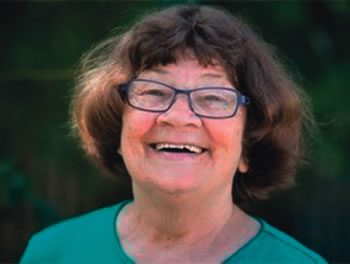The Present Moment

by Joy Cowley
We are told that we experience God in the present moment, and we know that as truth. But our brains are wired for learning from the past, planning for the future, and we’re not going to be rid of those habits. While we may find it impossible to live in the present moment, that very awareness can help us create spaces in our busy days where we know God in the here and now.
If the first step is awareness of the need to be in the present moment, the second is the recognition of the way we encounter the Sacred. Our intellect may be a fine tool for processing and evaluating our spiritual experience but it is not the means of that encounter. Our five senses - hearing, sight, taste, smell, touch - are the doorways to the direct "heart" experience of the greater reality.
Most days, these doors are only just ajar. We can eat without tasting, hear without actively listening, see without observing, touch in a superficial way. It’s when we pay close attention to our senses that we come into the present moment and fling the doors wide open to prayer.
When did you last listen to music that carried you out of yourself to a state beyond description? Your heart expanded with sound, and tears came to your eyes uninvited. You felt yourself in the presence of unnameable beauty.
When did your eyes drag you into natural scenery that swallowed you up, so that for an unmeasured moment you forgot who you were? It wasn't that you were nothing; but that you were everything, a part of every tree, fern, water, mountain. And you knew, absolutely knew in that moment, the oneness of God.
Can you remember a time swimming when the smooth repetitive strokes became like a mantra and you felt that your skin had dissolved to become one with the water?
And taste? When did you last taste God in a ripe peach or a cold beer on a hot summer day?
For most of us, finding God in the present moment is a three-stage exercise of awareness:
(1) knowing that we tend to live in our heads.
(2) paying full attention to our senses.
(3) allowing ourselves to be carried through the doorway to that state of holy awe we call prayer.
 This kind of awareness prayer takes only a minute here and there in our busy day. It can be a pause at a bus stop, a hesitation during a meal, a connection with the sky above us, or the daisies at our feet. The exercise is so simple, and it always brings us profound gratitude.
This kind of awareness prayer takes only a minute here and there in our busy day. It can be a pause at a bus stop, a hesitation during a meal, a connection with the sky above us, or the daisies at our feet. The exercise is so simple, and it always brings us profound gratitude.
Most of the time our senses serve us in a functional manner; but when we allow them to take us into the mystery of the present moment, we find God everywhere.
 Entries(RSS)
Entries(RSS)